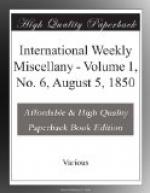“Such persons as know from experience that literary people are not always in private life what their writings would betoken, that Miss Bunions do not precisely resemble March violets, and mourners upon paper may be laughers over mahogany—such persons will not be surprised to hear that the Longfellow is a very jolly fellow, a lover of fun and good dinners, and of an amiability and personal popularity that have aided not a little the popularity of his writings in verse and prose—for he writes prose too, prettier, quainter, more figurative, and more poetic if anything, than his poetry. He is also a professor at Harvard College, near Boston.
“EDGAR A. POE, like Longfellow and most of the other American poets, wrote prose as well as poetry, having produced a number of wild, grotesque, and powerfully-imagined tales; unlike most of them he was a literary man pur sang. He depended for support entirely on his writings, and his career was more like the precarious existence of an author in the time of Johnson and Savage than the decent life of an author in our own day. He was a Southerner by birth, acquired a liberal education, and what the French call ‘expansive’ tastes, was adopted by a rich relative, quarreled with him, married ‘for love,’ and lived by editing magazines in Richmond, Philadelphia, and New York; by delivering lectures (the never-failing last resort of the American literary adventurer); by the occasional subscriptions of compassionate acquaintances or admiring friends—any way he could—for eighteen or nineteen years: lost his wife, involved himself in endless difficulties, and finally died in what should have been the prime of his life, about six months ago. His enemies attributed his untimely death to intemperance; his writings would rather lead to the belief that he was an habitual taker of opium. If it make a man a poet to be
Dowered with the hate of hate, the scorn
of scorn,
The love of love,
Poe was certainly a poet. Virulently and ceaselessly abused by his enemies (who included a large portion of the press), he was worshiped to infatuation by his friends. The severity of his editorial criticisms, and the erratic course of his life, fully account for the former circumstance; the latter is probably to be attributed, in part at least, to pity for his mishaps.




